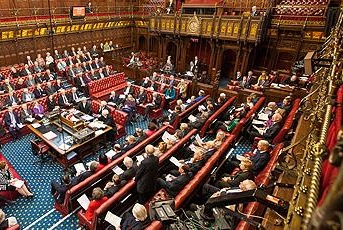Lords vote in favour of amendment to ensure Bill maintains full compliance with international and domestic law
The Parliamentary process known as 'ping pong' has begun over the Safety of Rwanda (Asylum and Immigration) Bill as the House of Lords this evening inflicted a number of large defeats upon the Government. The Lords will be batting the Bill back to the Commons with significant amendments.
 Image credit: UK GovernmentThe defeats came on the first day of the Bill's committee stage in the Lords. A second day is scheduled on Wednesday.
Image credit: UK GovernmentThe defeats came on the first day of the Bill's committee stage in the Lords. A second day is scheduled on Wednesday.
Five votes were held this evening and all were lost by the Government.
In the first of today's divisions, the Lords voted against the Government and in favour of Lord Coaker's amendment to ensure that the eventual Safety of Rwanda (Asylum and Immigration) Act will be fully compliant with the rule of law while maintaining full compliance with international and domestic law.
Moving his amendment, Lord Coaker said: "The Bill says that the facts are not convenient so we will change them by legislation, saying that Rwanda is safe by an Act of law rather than by application of that legislation to the facts as they are within the country."
Lord Coaker commented that the Bill's dismissal of the validity of international law in Clause 1(4)(b) was "quite astonishing". He continued: "The Bill … lists all the various laws and conventions which will not apply. As a country, is that really where we want our legislation to be? My noble friend Lady Lawrence referred to the UNHCR's view that the Bill is incompatible. Do we simply dismiss that with a wave of the hand and pass legislation to say that it does not matter? … All sorts of other conventions are dismissed with a wave of the hand as though they do not matter."
Lord Coaker stressed: "My amendment says that it matters what this country does, with respect to both domestic and international law, because in all the international institutions of which we are a member we often stand up and say that international law is important and should be applied and adhered to."
Lord Stewart of Dirleton, the Advocate-General for Scotland, spoke for the Government and against Lord Coaker's amendment, telling the Lords: "The Bill is predicated on Rwanda's and the United Kingdom's compliance with international law in the form of the treaty, which itself reflects the international legal obligations of the United Kingdom and Rwanda … As has been stated in the debates on this Bill, the Government take their international obligations, including under the European Convention on Human Rights, seriously. There is nothing in this Bill that requires any act or omission that conflicts with the United Kingdom's international obligations."
The vote was won with a substantial majority of over 100 as 274 peers voted for Lord Coaker's amendment and 172 against.
The second defeat for the Government saw the Lords vote by 282 votes to 180 in favour of Lord Hope of Craighhead's amendment saying Parliament cannot judge Rwanda to be a safe country until the Rwanda Treaty has been, and continues to be, fully implemented.
Lord Hope stated: "The question is whether we have enough information to enable us to judge that Rwanda is safe now and that it will be whatever may happen in future. I do not think so. I do not think I can make that judgment. That is why I have introduced this amendment and its counterpart … The point it makes is that full implementation of the treaty is a pre-requisite. The treaty itself is not enough; it has to be implemented. That is what I am drawing attention to. Without that—without the implementation that the treaty provides for—Rwanda cannot be considered a safe country; in my submission, the Bill should say so."
Another large defeat occurred in the third vote of the day. By 277 votes to 167, peers voted for Lord Hope of Craighhead's related amendment. It specifies that the independent Monitoring Committee set up to monitor the relocation of individuals to Rwanda would be required to regularly advise the Home Secretary whether the provisions of the Treaty are being adhered to in practice. The amendment also specifies that the Treaty would cease to be treated as fully implemented should the Monitoring Committee advise the Home Secretary that the provisions are not being adhered to.
Defeat number four followed when peers voted by 258 votes to 171 for Lord Anderson of Ipswich's motion amending Clause 2 of the Bill to allow decision-makers, including courts and tribunals, to rebut the presumption that Rwanda is a safe country if they are presented with credible evidence that it is not.
Lord Anderson told the House of Lords: "If Rwanda is safe, as the Government would have us declare, it has nothing to fear from such scrutiny, yet we are invited to adopt a fiction, to wrap it in the cloak of parliamentary sovereignty and to grant it permanent immunity from challenge—to tell an untruth and call it truth. Why would we go along with that? Clause 2 takes us for fools."
A fifth defeat came when peers backed a further amendment by Lord Anderson giving courts the power to hear arguments against the presumption that Rwanda is safe. It passed by by 260 votes to 169.
Further votes will be held on Wednesday.